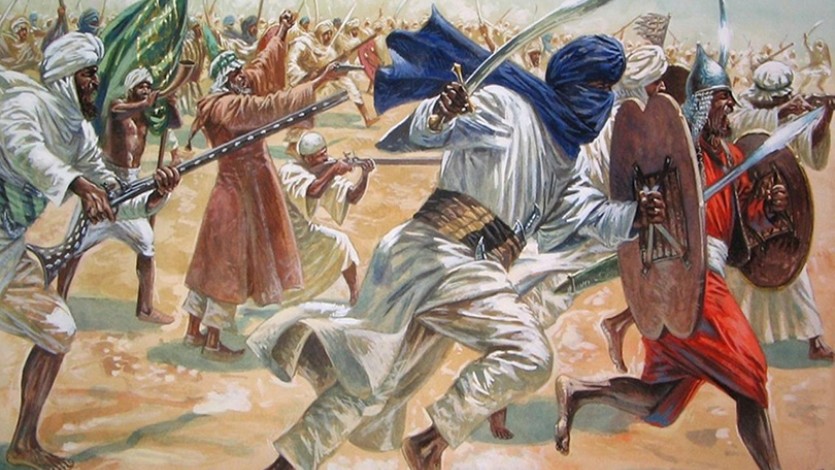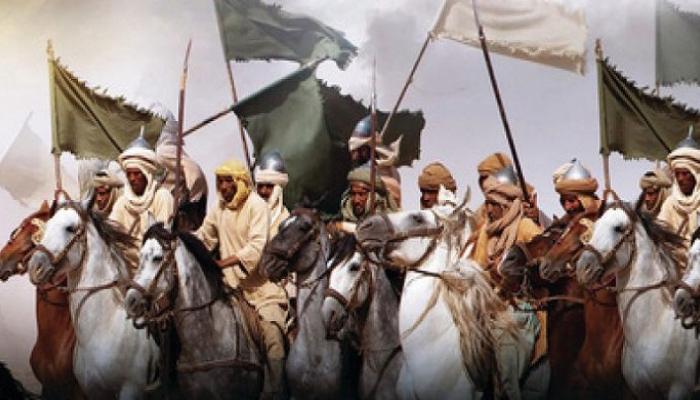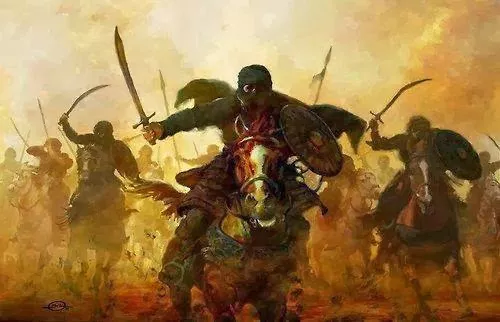
Muhammad‘s Charter – Jews and Muslims unite to defend against enemies
Medina and its suburb were at this time inhabited by three distinct parties, the Emigrants, the
Helpers, and the Jews. In order to weld them together into an orderly federation, the Prophet
granted a charter to the people, clearly defining their rights and obligations.
This charter represented the framework of the first commonwealth organized by the Prophet. It started thus:
‘In the name of he Most Merciful and Compassionate Lord, this charter is given by Muhammad,
the Messenger of Allah to all believers, whether of Quraish or Medina, and all individuals of
whatever origin who have made common cause with them, who shall all constitute one nation.”
The following are some extracts from the charter: The state of peace and war shall be common to
all Muslims; no one among them shall have the right of concluding peace with, or declaring war
against, the enemies of his co-religionists.
The Jews who attach themselves to our commonwealth shall be protected from all insults and vexations; they shall have an equal right with our people to our assistance and good offices.
The Jews of the various branches and all others domiciled in Medina shall form with the Muslims one composite nation; they shall practice their religion as freely as the Muslims.
The allies of the Jews shall enjoy the same security and freedom. The guilty shall be pursued and punished.
The Jews shall join the Muslims in defending Medina all enemies.
The interior of Medina shall be a sacred place for all who accept this charter. All true Muslims
shall hold in abhorrence every man guilty of crime, injustice or disorder; no one shall uphold the
culpable, though he be his nearest kin.
After dealing with the interior management of the State, the charter concluded as follows: “All
future disputes arising among those who accept this charter shall be referred, under Allah to the
Prophet.”
Thus this charter put an end to the state of anarchy that prevailed among the Arabs. It constituted
the Prophet Muhammad as chief magistrate of the nation.
Charter faces Mutiny (Inside enemies) – The Hypocrites and unsatisfied Jews
The party of the Ansars, or Helpers, included some lukewarm converts who retained an
ill-concealed predilection for idolatry. These were headed by Abdullah Ibn Ubai, a man with some
claims to distinction. They ostensibly joined Islam, but in secret were disaffected.
They often were a source of considerable danger to the newborn commonwealth and required unceasing
watchfulness on the part of the Prophet. Towards them he always showed the greatest patience
and forbearance, hoping in the end to win them over to the faith, which expectations were fully
justified by the result. While the death of Abdullah Ibn Ubai, his party which were known as the
party of the “Munafiqeen” (the Hypocrites) disappeared.
The Jews who constituted the third party of the Medinites were, however, the most serious
element of danger. No kindness or generous treatment on the part of the Prophet would seem to
satisfy them. They soon broke off and ranged themselves with the enemies of the new faith. They
did not hesitate to declare openly that they preferred idolatry, with its attendant evils, to the faith
of Islam. Thus, the Prophet had to keep an eye on his enemies outside Medina, on the one hand,
and those within the city on the other.
The Meccans who had sworn Muhammad’s death were well acquainted, thanks to the party of the Hypocrites and of the Jews at Medina, with the real forces of the Muslims.
They also knew that the Jews had accepted Muhammad’s alliance only from motives of temporary expedience and that they would break away from him to join the idolaters as soon as the latter showed themselves in the vicinity of Medina. The safety of the state required the proscription of the traitors who were secretly giving information to the common enemy.
About six men were executed for high treason of this nature.
Madina under Sabotage style attacks on Food, Cattle etc…
Towards the second year of the hijrah, the idolaters of Mecca began a series of hostile acts against
the Muslims of Medina. They sent men in parties to commit depredations on the fruit trees of the
Muslims of Medina and to carry away their flocks.
Now came the moment of severest trial to Islam. It became the duty of the Prophet to take serious measures to guard against any plot rising from within or a sudden attack from without.
Battle of Badr – Makkan Troop formations approaching Madina

Allah’s Prophet put Medina in a state of military discipline. He had to send frequent reconnoitering parties to guard against any sudden onslaught.
No sooner did the Prophet organize hi state than a large well-equipped army of the Meccans was afield. A force constituting of one thousand men marched under Abu Jahl, a great enemy of Islam, towards Medina to attack the city.
The Muslims received timely notice of their enemies’ intention. A body of three hundred
adherents, of whom two thirds were citizens of Medina, was gathered to forestall the idolaters by occupying the valley of Badr, situated near the sea between Mecca and Medina.
When the Prophet saw the army of the infidels approaching the valley, he prayed that the little band of
Muslims might not be destroyed
Victory – Battle Badr is Won

The army of the Meccans advanced into the open space which separated the Muslims from the
idolaters. According to Arab usage, the battle was began by simple combats.
The engagement that became general. The result of the battle was that the Meccans were driven back with great loss.
Several of their chiefs were slain, including Abu Jahl.
Allah’s Apostle set rules for treatment of POWs
A large number of idolaters remained prisoners in the hands of the Muslims. They were, contrary
to all usage and traditions of the Arabs, treated with the greatest humanity.
The Prophet gave strict orders that sympathy should be shown to them in their misfortune and
that they should be treated with kindness. These instructions were faithfully obeyed by the
Muslims to whose care the prisoners were confided.
Dealing with this event, Sir William Muir, in his book Life of Muhammad, quotes one of the prisoners saying: “Blessing be on the men of Medina; they made us ride, while they themselves walked; they gave us wheaten bread to eat, when there was little of it, contenting themselves with dates.”
Almighty Allah said:
“And Allah has already made you victorious at Badr, when you were a weak little force. So fear
Allah much (abstain from all kinds of sins and evil deeds which He has forbidden and love Allah
much, perform all kinds of good deeds which He has ordained) that you may be grateful.
(Remember) when you (Muhammad) said to the believers, “is it not enough for you that your
Lord (Allah) should help you with three thousand angels; sent down? Yes, if you hold on to
patience and piety, and the enemy comes rushing at you; your Lord will help you with five
thousand angels having marks of distinction. Allah made it not but as a message of good news
for you and as an assurance to your hearts. And there is no victory except from Allah the All
Mighty, the All Wise. That He might cut off a part of those who disbelieve, or expose them to
infamy, so that they retire frustrated.” (Ch 3:123-127 Quran).
The remarkable circumstances, which led to the victory of Badr, and results, which followed from
it, made a deep impression on the minds of the Muslims; the angels of the heaven had battled on
their side against their enemies. The division of the spoils created some dissension between the
Muslim warriors. For the moment, the Prophet divided it equally among all.
Subsequently, a Qur’an revelation laid down a rule for future division of the spoils. According to this rule, a fifth was reserved for the public treasury for the support of the poor and indigent, while the
distribution of the remaining four fifths was left to the discretion of the Chief of the State.
